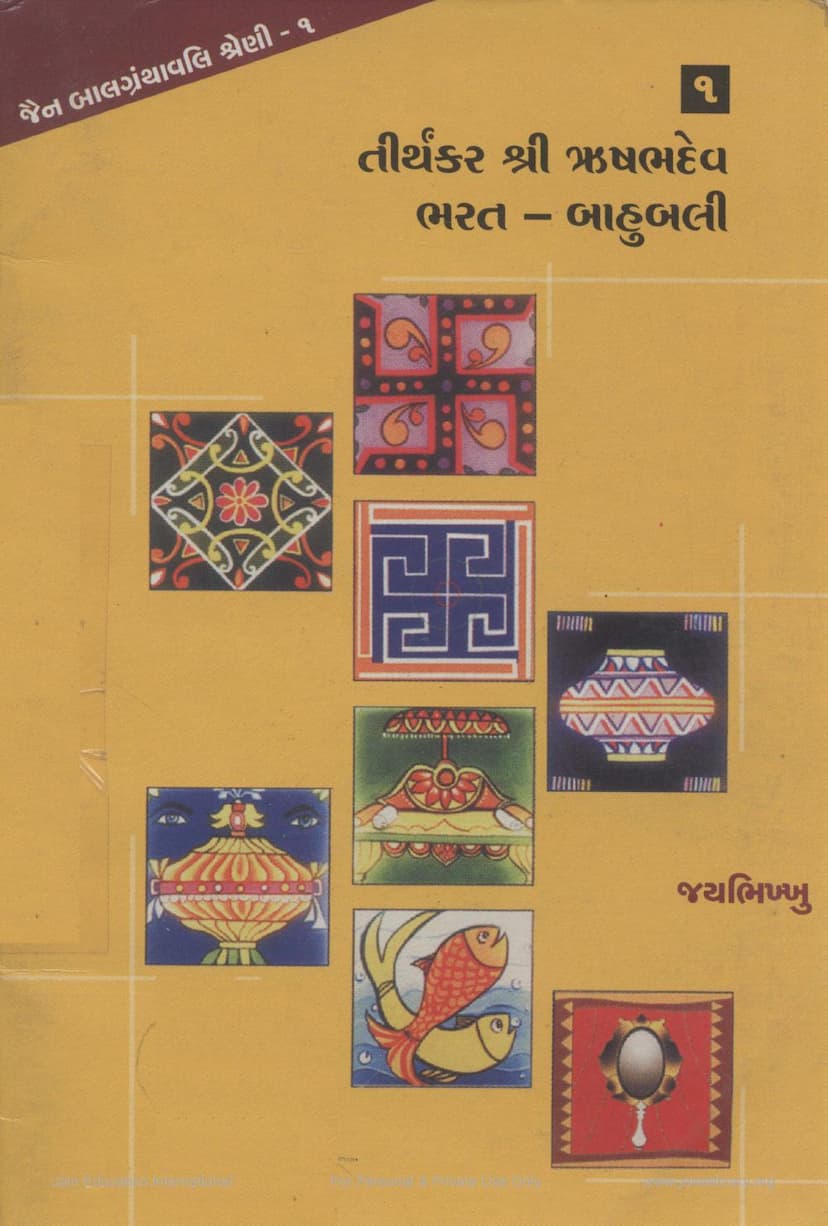Rushabhdev Tirthankar Bharat Bahubali
Added to library: September 2, 2025

Summary
This Jain text, titled "Rushabhdev Tirthankar Bharat Bahubali" by Jaybhikkhu, is part of the "Jain Balgranthavali Shreni-1" series, published by Jaybhikkhu Sahitya Trust in Ahmedabad. The book is dedicated to Lord Rushabhdev (also known as Adinath), the first Tirthankar of Jainism, and his prominent sons, Bharat and Bahubali.
The book recounts the early history of humanity, describing a time when people lived in harmony with nature, subsisting on fruits and natural water. It highlights the transition of humanity from a natural state to one requiring organization and development, a process facilitated by Kulankars, individuals who introduced societal structures.
Lord Rushabhdev's Life and Teachings:
- Origin: The narrative begins with the birth of Rushabhdev to King Nabhi and Queen Marudevi. He is described as a prince of immense beauty and strength.
- Introduction of Arts and Sciences: As society evolved and resources became scarcer, people faced difficulties like indigestion from uncooked grains. Lord Rushabhdev, recognizing their needs, introduced fundamental advancements:
- Agriculture and Cooking: He taught people to grind, soak, and cook grains, first by demonstrating how to use fire (discovered from a lightning strike) and then by showing them how to make pottery for cooking.
- Housing and Art: He also instructed people on building houses and introduced the art of painting.
- Clothing: When people felt the need to cover themselves, he taught them to make clothes from tree bark.
- Establishment of Social Order: Recognizing the growing conflicts and disputes among people, Lord Rushabhdev understood the need for governance. He became the first king of the era, Adinath, and established a structured society. He taught people to domesticate animals for agriculture and dairy, thereby improving their livelihood and leading to the development of trade.
- Renunciation and Enlightenment: After establishing order, Adinath felt the need to impart spiritual knowledge. He established the concept of dana (charity) and, after distributing kingdoms to his many sons, renounced his worldly possessions to become a monk. He faced challenges in obtaining pure alms, and it was Shreyans Kumar, his great-grandson, who eventually offered him sugarcane juice, marking the end of his year-long penance.
- Attainment of Keval Gyan (Omniscience): Lord Rushabhdev eventually attained keval gyan (omniscience) and preached the Jain dharma, emphasizing principles like non-violence (ahimsa), truthfulness, non-stealing, chastity, and detachment. He established the Jain Sangh, comprising monks, nuns, and lay followers, thus becoming the first Tirthankar.
- Legacy: The book mentions significant pilgrimage sites associated with Lord Rushabhdev and his enduring influence.
The Story of Bharat and Bahubali:
The latter part of the book focuses on Lord Rushabhdev's sons, Bharat and Bahubali.
- Bharat's Ambition: Bharat, the elder son, was a powerful emperor who conquered six continents and aspired to become a Chakravarti (Universal Emperor).
- The Conflict: To achieve this, Bharat needed to conquer the kingdom of his younger brother, Bahubali, who ruled from Taxila. Bahubali was known for his immense strength and valor. Bharat sent an envoy to Bahubali, demanding his submission.
- Bahubali's Refusal: Bahubali, devoted to his father's teachings, refused to be a subordinate. He stated that they lived by their father's blessings and did not wish for conflict but would defend their honor.
- The Duels: A conflict seemed inevitable. To avoid harming their subjects, Bharat and Bahubali agreed to resolve their dispute through personal combat. They engaged in:
- Eye Combat (Drishti Yuddha): They stared at each other, and the first to blink would lose. Bahubali won this duel.
- Sound Combat (Naad Yuddha): They roared, and the one whose sound was more imposing would win. Bahubali's roar was more powerful, and he won this duel as well.
- Mace Combat: Angered by his second defeat, Bharat attacked Bahubali with a mace. Bahubali was struck and fell to his knees but soon recovered.
- Chakra Attack: Bharat, in his rage, then used his Chakra (discus weapon) to attack Bahubali, violating the rules of combat as it was a divine weapon. However, the Chakra circled Bahubali, refusing to strike him due to their fraternal bond.
- Bahubali's Renunciation: Witnessing Bharat's actions and realizing the corrupting influence of pride and attachment to power, Bahubali had a profound realization. He struck his own arm with his fist, intending to kill Bharat, but then remembered his father's teachings. He renounced his anger and pride, plucked out his hair, and became an ascetic, dedicating himself to severe penance.
- Bharat's Realization and Reign: Bharat, remorseful, was relieved of his anger and continued to rule justly. He understood the true meaning of power and detachment through his brother's example. The land was named Bharatbhumi after him. He became known for his immense wealth, generosity, and establishment of institutions for learning and charity.
- Bharat's Detachment: Later in life, Bharat, while admiring his reflection, realized the ephemeral nature of external beauty and possessions. This realization led him to experience detachment and eventually attain keval gyan.
The book emphasizes the virtues of renunciation, detachment, self-control, and adherence to righteous principles, highlighting how even powerful rulers can achieve spiritual liberation through understanding and practice. The story of Bharat and Bahubali serves as a powerful illustration of the Jain ideals of dharma, karma, and the ultimate triumph of spiritual detachment over worldly ambition.